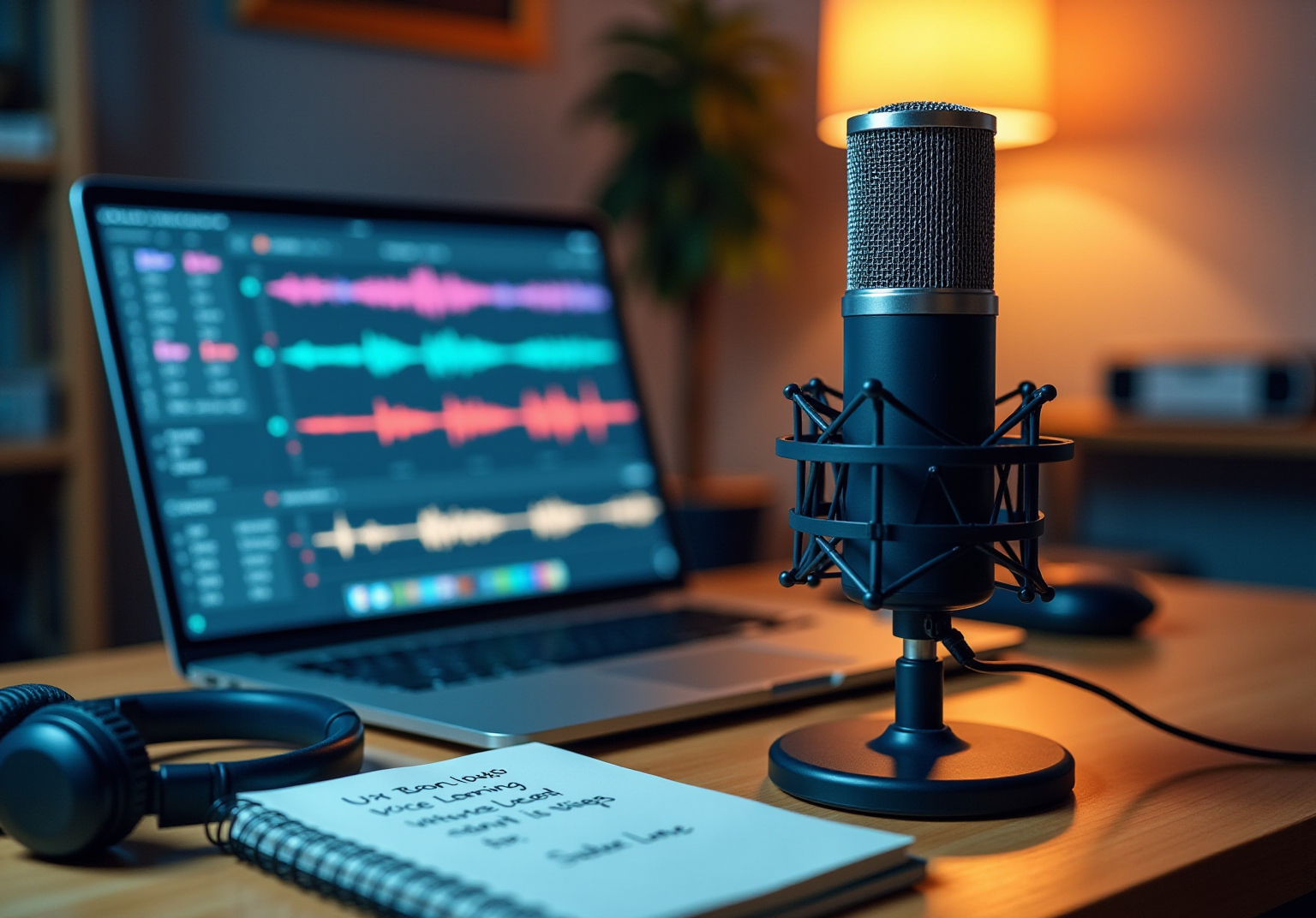
4 Steps to Clone Your Voice for Sales Success
GeneralOverview
The article delineates four crucial steps to effectively clone your voice for sales success. It underscores the significance of:
- Choosing the appropriate tools
- Collecting high-quality audio samples
- Adeptly employing the cloned voice in sales communications
By detailing the advantages of voice cloning—such as personalised outreach and automated follow-ups—it illustrates how these elements can markedly enhance customer engagement and bolster sales performance.
Introduction
Harnessing the power of voice cloning technology is revolutionising the sales landscape, enabling professionals to engage clients in unprecedented ways. This innovative approach allows for the creation of personalised audio interactions that resonate with customers, ultimately driving sales success.
However, as this technology becomes increasingly accessible, it raises critical questions about its ethical implications and the potential for misuse. Sales teams must effectively navigate these challenges while leveraging voice cloning to enhance their outreach and communication strategies.
How will they rise to the occasion?
Understand Voice Cloning Technology
Vocal replication technology harnesses artificial intelligence to analyse and reproduce human speech patterns, allowing users to clone your voice by generating synthetic sounds that closely mimic the original speaker’s tone, pitch, and inflexion. This technology has seen remarkable advancements, particularly in commerce, where it significantly enhances communication and client interaction. For sales professionals aiming to leverage its capabilities, understanding the fundamental principles to clone your voice is crucial. Key components include:
- Machine Learning Algorithms: These advanced algorithms analyse voice samples to identify unique vocal traits, facilitating precise replication.
- Data Requirements: Effective sound reproduction necessitates a substantial collection of high-quality audio samples, ensuring the synthetic output accurately reflects the original speaker.
- Utilisations: You can clone your voice for personalised commercial calls, automated responses, and promotional content, ensuring a consistent brand tone across various platforms.
At Agentics, we understand that integrating AI into your business is not about an overnight transformation — it’s about strategically advancing with a customised approach. Our DARE to Deploy AI™ process guarantees that each deployment is tailored to your specific needs. This process encompasses:
- Discovery & Diagnostics: We initiate with a complimentary 20-minute discovery call to discuss your business objectives and challenges.
- Audit & Agreement: Upon agreement to proceed, we perform a thorough audit and develop a personalised proposal detailing the recommended AI solution.
- Requirements & Readiness: We collaborate closely with you to gather the necessary tools and finalise objectives, ensuring clarity in project mapping.
- Execution & Evolution: We design and implement your AI systems, including Voice AI agents, while continuously monitoring and refining the solution for sustained success.
The global audio replication market is projected to reach USD 16.2 billion by 2032, growing at a CAGR of 27.3%. This expansion underscores the increasing importance of audio replication technology in enhancing sales communication. As AI expert Aneesh Raman observes, “AI is going to change everything about business, including how sellers sell, buyers buy, and the ability to clone your voice.”
Nevertheless, it is vital to consider the ethical implications of audio replication technology, as its misuse can pose significant risks, including fraud. A recent incident involved cybercriminals using audio cloning to impersonate a CEO, resulting in a fraudulent transfer of $243,000. By mastering these concepts and utilising Agentics’ tailored solutions, sales teams can effectively elevate outreach efforts and enhance customer interactions, ultimately driving sales success.
Create Your Voice Clone: Step-by-Step Process
Creating your voice clone involves several key steps that can significantly enhance your sales efforts:
-
Choose a Speech Replication Tool: Select a reputable speech replication software, such as ElevenLabs or Lovo.ai, known for their advanced capabilities and user-friendly interfaces. Lovo.ai, for instance, is trusted by over 2 million users for its cloning applications.
-
Gather Audio Samples: Record at least one minute of clear, high-quality sound of yourself. Ensure varied speech patterns and emotions to enhance the clone’s realism; remember, one good minute of audio is often more effective than multiple rushed recordings. It is crucial to maintain proper microphone distance and choose a suitable recording environment to achieve optimal quality.
-
Upload Audio to the Tool: Follow the software’s instructions to upload your audio samples. Most platforms provide straightforward guidance to facilitate this process.
-
Train the Model: Allow the software to process your audio. This training phase may take a few minutes, depending on the tool and the amount of data provided.
-
Test Your Speech Clone: Once the model is trained, generate speech to assess your speech clone. Make adjustments as necessary to improve accuracy and naturalness.
-
Incorporate into Commercial Procedures: Utilise your vocal replica in sales conversations, automated replies, or promotional content to boost customer interaction.
By following these steps, you can clone your voice to create an audio clone that not only enhances your sales efforts but also allows for more personalised and efficient communication.
Troubleshoot Common Voice Cloning Issues
When utilising voice cloning technology, users may encounter several prevalent challenges that require attention:
- Robotic Sounding Voice: To prevent an unnatural sound in the cloned voice, it is essential to ensure that the audio samples used for training are diverse and expressive. High-quality audio recordings are more significant than sheer volume; if necessary, re-record to capture a broader range of vocal nuances. Remember, the audio recording for successful cloning should exceed a minute in duration and be free from background noise.
- Inconsistent Output: Inconsistencies in the auditory clone can often be traced back to the quality of the audio recordings. Background noise or low recording quality can severely impact the final outcome, so prioritise high-quality, noise-free recordings. Additionally, labelling audio samples with traits such as accent, gender, and age can aid in creating a more precise and personalised clone.
- Long Processing Times: If the model’s training duration is excessively prolonged, consider reducing the volume of audio data or selecting a more powerful speech synthesis tool capable of managing larger datasets efficiently.
- Technical Errors: For software-related issues, refer to the tool’s support documentation or community forums for troubleshooting advice. Engaging with user communities can provide valuable insights and solutions from others who have faced similar challenges.
Furthermore, users must recognise the potential dangers linked to vocal imitation, particularly the rise of fraudulent activities utilising replicated speech. By acknowledging these common problems and implementing the recommended solutions, users can enhance their audio replication experience and achieve optimal outcomes.
Leverage Voice Cloning for Sales Success
To harness the power of voice cloning for sales success, consider implementing the following strategies:
-
Personalised Outreach: Leverage your voice clone to craft tailored messages for potential clients, significantly enhancing engagement and fostering a deeper connexion. Personalised communication can lead to a 70% increase in customer satisfaction, as consumers increasingly prefer interactions that resonate with their individual preferences.
-
Automated Follow-Ups: Utilise audio replicas to clone your voice for automated follow-up calls, ensuring consistent communication while preserving a personal touch. This method can enhance conversion rates by up to 20%, as timely and personalised follow-ups are essential in sustaining customer interest.
-
Training and Development: Utilise audio replicas in training sessions for marketing teams, enabling them to rehearse realistic scenarios and enhance their abilities. This method not only enhances learning but also prepares teams to engage more effectively with clients, leading to improved performance.
To ensure brand consistency, you can maintain a uniform brand tone across all distribution channels by using vocal replication technology to clone your voice. This reinforces brand identity and builds trust with customers, which is essential in competitive markets where 65% of consumers are more likely to remain loyal to brands that offer personalised experiences.
- Scalability: Voice replication technology enables sales groups to greatly expand their outreach efforts, facilitating more calls and interactions without requiring extra resources. This scalability is vital, especially as 83% of B2B marketers report improved lead generation from personalised outreach.
By integrating these strategies, sales professionals can enhance their effectiveness and drive better results through the innovative application of voice cloning technology.
Conclusion
Voice cloning technology presents a transformative opportunity for sales professionals, empowering them to enhance communication and client interactions through the replication of their unique vocal characteristics. Mastering the intricacies of this technology enables individuals to create a powerful tool that not only personalises outreach but also strengthens brand identity in an increasingly competitive landscape.
This article explores the essential steps of voice cloning, from selecting the right software and gathering quality audio samples to troubleshooting common issues that may arise during the process. It emphasises the importance of high-quality recordings and diverse vocal expressions to avoid robotic outputs. Furthermore, it highlights the strategic applications of voice clones in automated follow-ups and training sessions, which drive engagement and improve sales performance.
Ultimately, embracing voice cloning technology transcends merely adopting a new tool; it revolutionises sales strategies to foster deeper connexions with customers. By leveraging personalised communication and maintaining brand consistency, sales teams can significantly boost their outreach efforts, leading to increased customer satisfaction and loyalty. As the sales landscape continues to evolve, integrating voice cloning into sales practises will be a crucial step toward achieving sustained success and enhancing the overall customer experience.
Frequently Asked Questions
What is voice cloning technology?
Voice cloning technology uses artificial intelligence to analyse and reproduce human speech patterns, allowing users to generate synthetic sounds that closely mimic the original speaker’s tone, pitch, and inflexion.
How does voice cloning technology work?
The technology relies on machine learning algorithms that analyse voice samples to identify unique vocal traits, which facilitates precise replication. A substantial collection of high-quality audio samples is required for effective sound reproduction.
What are some applications of voice cloning technology?
Voice cloning can be used for personalised commercial calls, automated responses, and promotional content, ensuring a consistent brand tone across various platforms.
What is the DARE to Deploy AI™ process at Agentics?
The DARE to Deploy AI™ process includes a Discovery & Diagnostics phase with a complimentary call, an Audit & Agreement phase for thorough assessments and proposals, Requirements & Readiness for gathering necessary tools, and Execution & Evolution for designing and implementing AI systems while monitoring for sustained success.
What is the projected growth of the global audio replication market?
The global audio replication market is projected to reach USD 16.2 billion by 2032, growing at a compound annual growth rate (CAGR) of 27.3%.
What are the ethical implications of voice cloning technology?
The misuse of audio replication technology can pose significant risks, including fraud. An example includes cybercriminals using audio cloning to impersonate a CEO, resulting in a fraudulent transfer of $243,000.
How can sales teams benefit from voice cloning technology?
By mastering the principles of voice cloning and utilising tailored solutions from Agentics, sales teams can effectively elevate their outreach efforts and enhance customer interactions, ultimately driving sales success.
Enjoyed this post? Share it with your network!
10 Best AI Sales Tools to Boost Your Team’s Performance

Discover the top 10 best AI sales tools to enhance team performance and drive revenue growth.
Mastering Test Call Numbers: A Step-by-Step Guide for Sales Directors

Elevate your communication with our guide on mastering test call numbers for sales success.
7 Ways Automated Outbound Calls Boost Sales Performance

Discover how automated outbound calls enhance sales performance and streamline communication.
